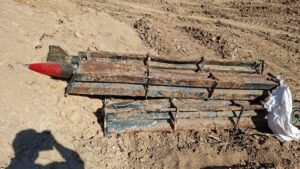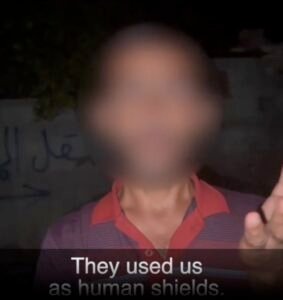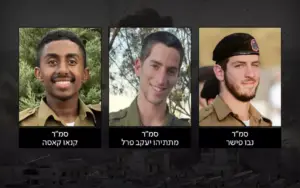Hostage Updates:
As expected, Hamas is dragging out a response to the proposal. This morning they refused to sent a delegation to negotiate in Cairo saying they won’t go until Israel guarantees a complete ceasefire. Now it appears that they will send a delegation on Wednesday, but will still demand that Israel agree to a complete ceasefire and withdrawal before signing—even though that agreement is only supposed to be negotiated before Phase Two of the deal.
According to Israel’s Channel 11, the Israeli war cabinet unanimously decided to demand a guarantee from the U.S. that Israel will be able to continue the war at any point, if Hamas is not fulfilling the conditions of the war, or dragging out negotiations between phases.
US State Department Spokesman, Matthew Miller today confirmed the US’s agreement that Hamas cannot continue to govern Gaza after the war. However, he expressed that the US’s view is that Hamas can’t be defeated in a military campaign, but needs to be defeated in some sort of political path forward. This largely contradicts the Israeli view that both are needed, and indicates that the US plans to push negotiations towards some sort of gradual decrease in Hamas’s authority in Gaza.
CIA Director Bill Burns is expected to arrive for a round of visits in the Middle East together with a senior adviser Brett McGurk to the American president in order to promote the negotiations for the hostage release-ceasefire proposal.
The Tikva Forum, which represents some of the families of hostages, came out today in strong opposition to the proposal, stating that after a careful review, they have come to the conclusion that the arrangement will risk the lives of hostages more than it will save them, and will lead to more IDF casualties down the line. They also addressed the Biden administration’s pressure on the Israeli government, and wrote: “We respectfully ask the President to trust our experience and expertise on the Middle East.”
Gaza Front Updates:
Hamas did not successfully fire on Israeli civilians today.
Thank G-d, the IDF did not announce any fallen heroes today.
Four divisions of IDF troops are currently operating in Gaza: part of the 98th in al-Bureij, the 99th Division along the Netzarim Corridor, Central Gaza, and in the Zeitoun neighborhood of Gaza City; The Gaza Division in various areas in Gaza on pinpoint operations in areas such as Beit Hanoun and the buffer zone; and the 162nd Division in Rafah and along the Philadelphi Corridor. The Israeli Air Force struck 65 Hamas targets across Gaza throughout the day, including terrorist squads, rocket launching positions, weapons depots, and other Hamas infrastructure.
After 10 days, the IDF wrapped up a pinpoint operation in the Gaza City neighborhood of Sabra. The raid focused on cleaning up Hamas infrastructure and terrorist regroupings/ At the completion of the operation, combat engineers demolished a 1.5 kilometer long, and 23 meters deep Hamas tunnel in the area. During the operation, dozens of terrorists were eliminated, and around 70 Hamas sites were destroyed.
Pinpoint operations are ongoing in the Shejaya and Zeitoun neighborhoods of Gaza City.
The IDF is adding focus on the Central Gaza area.
One brigade of the 98th Division re-entered Gaza for a new operation in al-Bureij, Central Gaza. The IDF previously carried out a short operation on the outskirts of the city in January. The new operation began with targeted airstrikes, including a very cautious airstrike against a Hamas compound which was located inside the UNRWA Abu Alhilu school building. The airstrike used limited and precise munitions to avoid harming civilians in the area.
Reports indicate that troops have maneuvered into the al-Asrah neighborhood, north of Nuseirat. This neighborhood is also dubbed “the prisoner’s neighborhood,” because it was built after the Gilad Shalit deal to house many of the 1,027 terrorists who were released from Israeli prison. The IDF already heavily bombed this neighborhood in April, but did not yet enter. On October 7th, some footage indicated that hostages were paraded through al-Asrah. Senior Hamas terrorists were later eliminated in a tunnel under nearby Nuseirat.
The IDF is continuing to advance in Rafah, and already controls 26% of the city, and is less than a kilometer away from the coast. While troops are thoroughly searching the area for Hamas infrastructure, the use of artillery and bombs is significantly lower than in the battles of Gaza City and Khan Younis, with a lower number of terrorists eliminated, in following the Biden administration’s demands for a reduced military operation. Still, troops eliminated several terrorists today, located significant tunnel shafts, and found more caches of weapons and rockets.
The IDF continues to control the Philadelphi Corridor, blocking Hamas from smuggling in new weapons.
Gaza Humanitarian Efforts Updates:
The Gazan side of the Kerem Shalom Shalom crossing is at full capacity, with the content of over 1,000 aid trucks waiting to be picked up by UN aid agencies.
On Monday, June 3:
259 aid trucks were transferred to Gaza
Only 105 trucks of aid were picked up on the Gazan side of Kerem Shalom by UN bodies
37 trucks were coordinated to northern Gaza, along with 1 fuel truck
The UN continues to demand that Israel transfer more aid to Gaza, but isn’t actually doing their job of picking it up and delivering it. This despite the IDF giving clear secured routes for delivery.
Northern Front Updates:
Hezbollah continued with the escalated fire on Israel’s far north, with the furthest drone reaching the coast of Nahariya. Most rockets and attack drones were intercepted, with the shrapnel of one causing a fire in the Biriya Forest near Tzfat (Safed).
After Hezbollah projectiles set over 2,500 acres on fire, some which burned for 48 hours, this evening Israeli firefighters and volunteers finally got the fires under control.
The IDF continued with airstrikes against Hezbollah positions in Southern Lebanon, and eliminating active terrorists. Lebanese media reported an airstrike on a vehicle in the Western Beqaa District, slightly further into Lebanon than usual IDF airstrikes.
After an assessment with military and fire fighting officials, IDF Chief of Staff Lt. Gen. Herzi Halevi said that Israel is at a point where a decision needs to be made in response to Hezbollah’s attacks.
“We have been attacking for eight months, and Hezbollah is paying a very, very high price,” Halevi said. “It has increased its strengths [of attacks] in recent days and we are prepared after a very good process of training… to move to an attack in the north. We have a strong defense, preparedness, and are approaching a decision point.”
Those familiar with the military operations are skeptical that any larger operation will begin in the north while ceasefire negotiations are ongoing.
Judea and Samaria Updates:
A potentially horrific terror attack was prevented when IDF troops spotted and eliminated two terrorists who approached the security fence near Tulkarem, in an attempt to reach nearby Jewish communities. The two were armed with an assault rifle and a knife.
General Updates:
Israel’s Defense Ministry has signed a deal with the United States to procure a third squadron of F-35 fighter jets. The agreement includes 25 stealth fighters built by Lockheed Martin, with deliveries starting in 2028 at a rate of three to five planes per year. This will increase the Israeli Air Force’s F-35i fleet to 75 aircraft. Currently, only 36 out of the originally ordered 50 F-35s have been delivered. The deal, worth approximately $3 billion, is financed by US military aid to Israel. The signing follows a dispute between Defense Minister Yoav Gallant and Finance Minister Betzalel Smotrich, who had delayed the agreement until a Knesset committee reviewed the defense budget.




